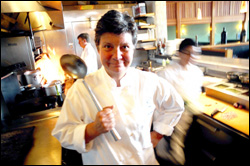Restaurants are like baby chicks. They’re vulnerable to so many unavoidable ills that survival to maturity is the exception, not the rule. But when a restaurant does manage to take root, developing a distinct personality and an admiring clientele, it’s always a shock to see it fold. It’s not just regular customers who are saddened; even successful competitors experience a sudden chill, a feeling that “there but for the grace of God. . . . “
The closure last week of Fandango, Christine Keff’s Caribbean-Latin eatery in Belltown, has given the food community a particular jolt. Keff is a superb chef and an experienced restaurateur. Her seafood restaurant, Flying Fish, just across the street from Fandango, is one of nouveau-Belltown’s enduring success stories. Fandango’s menu was tasty and imaginative without being trendy, offering plain Latin comfort foods, like handmade tamales, alongside spectacular presentations, such as a whole grilled fish with mounds of warm tortillas and spicy sides, able to feed a large party. The delectable tapas menu would have made Fandango’s bar a spot for easy lingering even without the spectacular array of rare tequilas on offer.
But despite years of effort, the Fandango formula ultimately didn’t work. Inquiries among culinary professionals—admirers all of Keff’s skill and imagination—yield a perspective on restaurant life that even constant diners-out rarely see, where economics and crowd psychology and sheer chance combine to render even the most acute business plan moot.
When Fandango opened in 1999, the Belltown boom was well under way, with landlords discovering that long-neglected properties could command 10 times or more the rents previously paid. The space Keff and her backers settled on for Fandango, an awkward L-shape, was not ideal. The main dining area (the short leg of the L) offered a splendid Sound view, but the table configuration failed to take advantage of it, with banquettes turning their backs to the view, while the kitchen, often a visual plus in contemporary dining rooms, was completely out of sight, strung out along the long, skinny leg. The street-side bar, while cozy and attractive, felt completely cut off from the rest of the restaurant.
There was also the problem of parking, which is particularly inconvenient, congested, and expensive in Fandango’s part of Belltown. Valet parking, a service provided by some neighborhood eateries, is expensive and off-putting to many diners and, given Fandango’s easy, familial approach to dining, didn’t fit the concept. But lack of parking certainly contributed to the restaurant’s difficulty drawing a steady clientele.
Keff’s passion for the foods of Mexico and the Caribbean was informed by deep personal experience, and she made sure her staff was exposed to the varied cuisines of the area. But despite the growing fashionability of Latin culture in the society at large, Seattle diners proved resolutely resistant to its charm when expressed in culinary form. “I think Chris was a little ahead of the curve,” says one of her friendly Belltown competitors. “The kind of specialty menu she offered has worked in places like Miami and even Chicago, but I think people here still think Latin food is cheap—burritos and tacos and the like.”
That idea is seconded by another Belltown-based restaurateur: “Fandango had the press totally behind it from the day it opened, but they still couldn’t get people into the restaurant. You’d think that, with Flying Fish jamming right across the way and turning people away, they would have been able to generate traffic just from the overflow, but it didn’t work out that way. When you’re operating a white-tablecloth restaurant, especially if you’re trying to pay staff a living wage, you have expenses that just don’t allow you to compete with the cheaper ethnic places. But the fact that a place as good as Fandango could fail, that’s scary. It means that in this economy, no one is safe.”
Keff acknowledges that the dot-com crash, particularly severe in downtown Seattle, had been a drag on Fandango’s trade almost from the beginning, but she sees another factor, more diffuse but broader, too. “I think that 9/11 has produced a long-term change in the way Americans relate to the world,” she says. “It’s not just a longing for the familiar, for comfort food. We’ve become obsessed with safety, and that colors every part of life. People just don’t want to take chances— on anything. And the way things have been going in the world, I don’t see that changing in the foreseeable future.”








